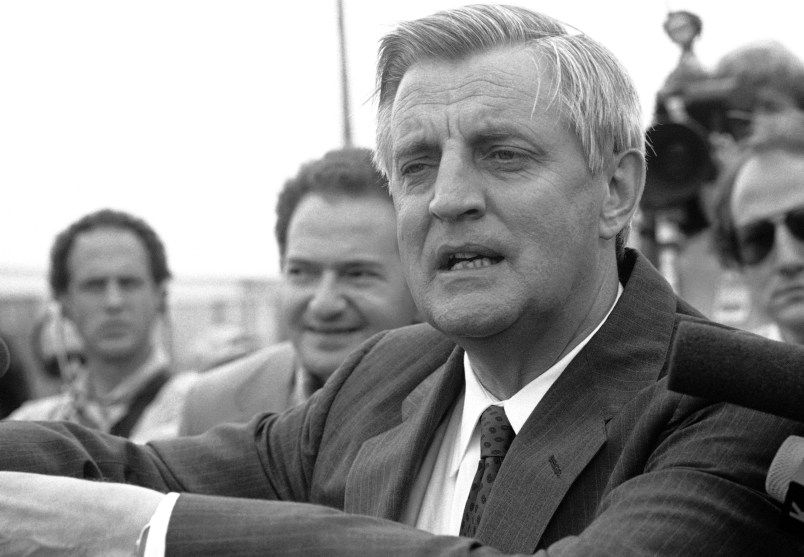Even for those with more than a passing interest in American political history, the name Walter Mondale usually symbolizes one and only one thing: one of the worst electoral defeats in the history of the presidency. Running against popular incumbent Ronald Reagan in the 1984 election, Mondale won only the District of Columbia and his home state of Minnesota (and that by fewer than 5,000 votes), garnering a meager 13 electoral votes to Reagan’s 525. It was the worst defeat for any Democratic presidential candidate in American history, a landslide loss so striking that it has understandably become synonymous with Mondale’s name in our political narratives.
Yet as the University of Minnesota’s Humphrey School of Public Affairs hosts two high-profile Washington, D.C. events Tuesday to honor Mondale’s “life and legacy”— speakers will include former President Jimmy Carter (for whom Mondale served as vice president) and current Vice President Joe Biden, among many other luminaries—it’s time we reassess Mondale’s place in our political and social histories. And in so doing, we find that he both contributed immeasurably to the late 20th century and helped pave the way for the 21st.
Only 36 and serving as Minnesota’s attorney general when he was appointed to fill Hubert Humphrey’s Senate seat in 1964, Mondale would go on to contribute significantly to some of the nation’s most controversial and crucial issues during his 12 years in the Senate. He did so immediately with regard to the period’s pressing civil rights issues, helping gain support for the 1965 Voting Rights Act and then co-sponsoring the 1968 Fair Housing Act (Title VIII of the Civil Rights Act), a law which finally outlawed housing discrimination after Congress had tried and failed to do so during the two prior sessions. In 1970 Mondale was named chair of both the Senate’s Subcommittee on Children and Youth and its Select Committee on Equal Education Opportunity, a vital new federal initiative through which he championed special education, bilingual instruction, and comprehensive child care among other reforms.
Those 1960s and 70s civil rights and educational efforts all contributed to shaping America’s social landscape in the decades that followed. Yet it was perhaps in his service to another 1970s committee, the Committee to Study Governmental Operations with Respect to Intelligence Agencies (better known as the Church Committee after its chair, Sen. Frank Church (D-ID)), that Mondale most helped shape our evolving political landscape. With the committee holding its hearings in late 1975 to early 1976, months during which Church was running a presidential campaign, Mondale took over operational leadership of those investigations, becoming in the process a vocal advocate of the need to return constitutional oversights and balances to the intelligence community. Thanks in no small measure to Mondale’s leadership, the committee’s work resulted in the 1978 Foreign Intelligence Surveillance Act (FISA), a law that has been central to our 21st century debates over security, the Constitution, and civil liberties.
Yet as enduring as those social and political influences have been, I would argue that it was another of Mondale’s innovations—and, ironically, one linked to the 1984 election—that has truly set the stage for our current moment. When it came time to pick a vice presidential running mate for his campaign, Mondale apparently resisted conventional wisdom choices like Sen. Lloyd Bentsen (D-TX), who could bring the South, or popular rival Gary Hart. Instead, Mondale wanted to choose a running mate who would move the nation’s social progress needle forward significantly: he considered Los Angeles’ African American Mayor Tom Bradley, San Antonio’s Hispanic Mayor Henry Cisneros, and San Francisco’s Jewish Mayor Dianne Feinstein before settling on Rep. Geraldine Ferraro (D-NY). Ferraro was the first woman nominated for the vice presidency by either major party, and truly represented the kind of social as well as political shift for which Mondale had hoped.
Hillary Clinton’s frontrunner status for the 2016 nomination has many antecedents to be sure. But none looms larger than Ferraro’s role in the 1984 campaign, a role that embodies the goals of social justice and equality for which her presidential running mate has fought throughout his long and influential career. Mondale may have lost that 84 election in historic fashion, but his overarching place in our 20th and 21st century histories is much more positive, and needs precisely the kinds of commemoration it will receive Tuesday in Washington.
Ben Railton is an Associate Professor of English and American Studies at Fitchburg State University and a member of the Scholars Strategy Network.







What really ought to be reassessed is how much Reagan’s place in history was fluffed up to cover how shitty it really was.
The stain of Gerry Ferraro’s deeply ugly role in the 2008 campaign being an irony best left unexamined.
What was that? I don’t remember.
Amen to that.